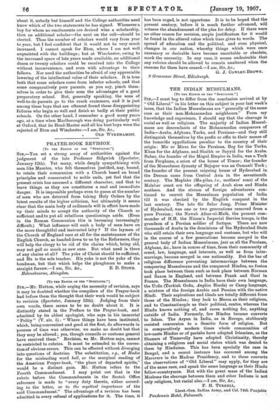THE INDIAN MUSSULMANS. [To rug Eorron or TOR SrscrsTos."] Sra,—I
must beg to differ from the conclusion' arrived at by " Old Liberal" in his letter on this subject in your last week's issue, that the Indian Mussulmans are "generally of the same race as their non-Mohammedan neighbours." From my knowledge and experience, I should say that the cleavage is racial as well as religious. The majority of Indian Mussul- mans are descendants of the Mohammedan conquerors of India—Arabs, Afghans, Turks, and Persians—and they still distinguish themselves by the prefix or affix to their names of the honorific appellations peculiar to the country of their origin : Mir or Mirza for the Persians, Beg for the Turks, Khan for the Afghans, and Shaikh or Sayyid for the Arabs. Behar•, the founder of the Mogul Empire in India, was a Tusk from Ferghana, a scion of the house of Timur; the founder of the Mussulman dynasty of Bejapur• was an Osmanli Turk ; the founder of the present reigning house of Hyderabad in the Deccan came from Central Asia in the seventeenth century. The Moplahs (Ma-pilas, i.e., mothers' sons) of the Malabar coast are the offspring of Arab sires and Hindu. mothers. And the stream of foreign adventurers con- tinued to recruit the Mussulman population of India till it was checked by the English conquest in the last century. The late Sir Salar Jang, Prime Minister of Hyderabad, was one or• two generations removed from a pure Persian;' the Nawab Afsar-ul-Mulk, the present com- mander of H.H. the Nizam's Imperial Service troops, is the grandson of a Persian soldier of fortune.' There are now thousands of Arabs in the dominions of the Hyderabad State who still retain their own language and customs, but who will in the course of a few generations become merged in the general body of Indian Mussulmans, just as all the Persians, Afghans, &c., have in course of time, from their community of creed, law, language, and interests, as well as from inter- marriage, become merged in one nationality. But the bar of religious difference preventing intermarriage between the conquering Mussulmans and the conquered Hindus, no fusion took place between them such as took place between Norman and Saxon in England, and between Frank and Gaul in France. The Mussulmans in India have their own language, the Urdu (Turkish Ordu, Anglice Horde) or Camp language, a mixture of the foreign Arabic and Persian with the native Hindi. Their aspirations and ideals are totally different from those of the Hindus ; they look to Mecca as their religions, and to Constantinople as their political, centre, whereas the Hindu knows nothing of, and cares nothing for, anything outside of India. Formerly, few Hindus became converts to Islam. The Aryan in India, as in Europe, stubbornly resisted conversion to a Semitic form of religion. But in comparatively modern times whole communities of low-caste Hindus or of pariahs have adopted Islamism, as the Shanars of Tinnevelly have adopted Christianity, thereby obtaining a religious and social status which was denied to them by Hinduism. This has been specially the case in Bengal, and a recent instance has occurred among the Maravers in the Madras Presidency, and to these converts the observations of "Old Liberal" may apply, foe they are of the same race, and speak the same language as their Hindu fellow-countrymen. But with the great mass of 'the Indiful Moslems the cleavage between them and other Indians is not only religious, but racial also.—I am. Sir, 8r.c.,
F. H. TYRRELL, Lient.-Gen. Indian Army, and Col. 74th Punjabis Pendennis Hotel, Falmouth, -






































 Previous page
Previous page